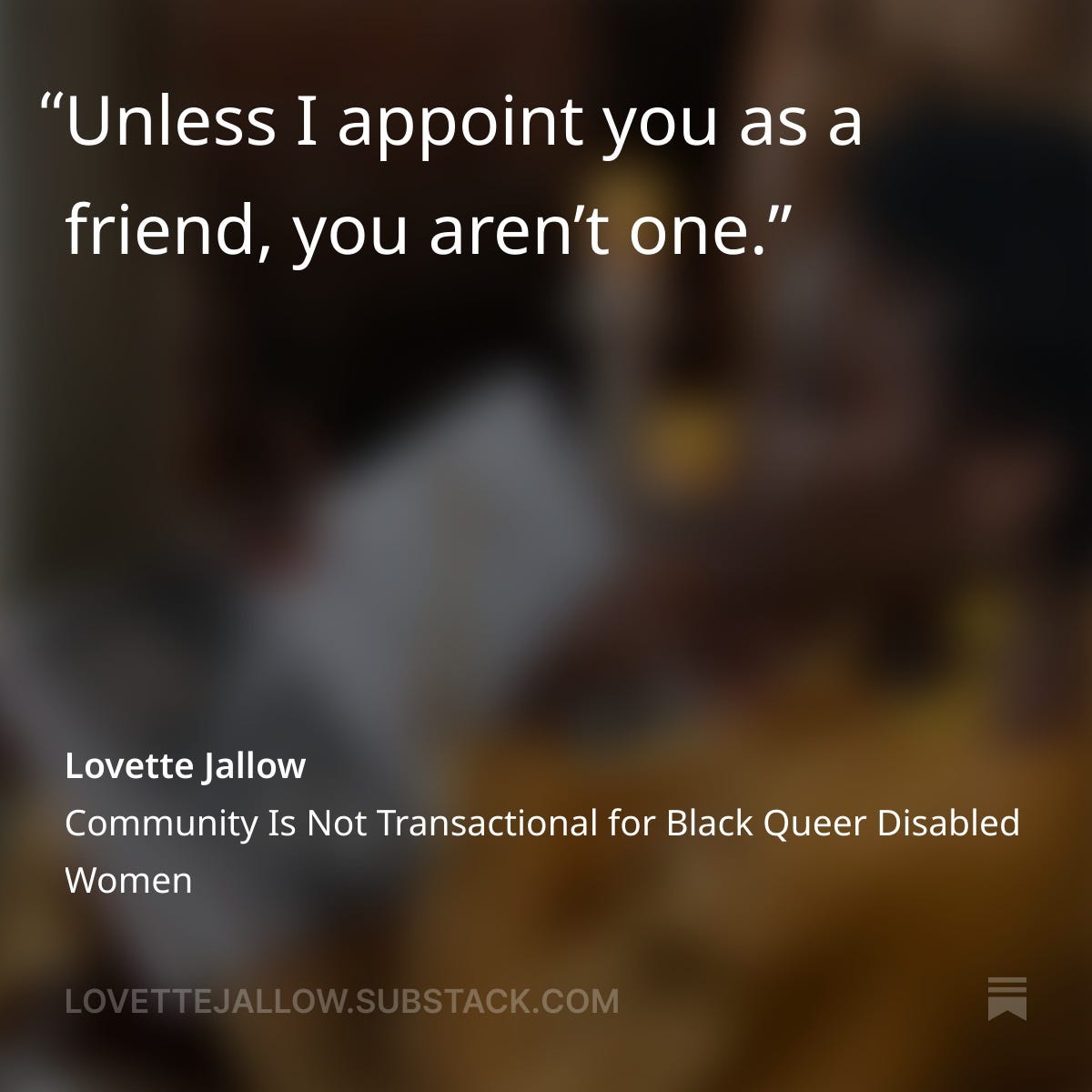When Anti-Racism Becomes Degradation Kink for White People
How White Guilt Turns Anti-Racism Into Performance Without Change
How White Guilt Hijacks Anti-Racism Work
If your shame demands to be held but nothing is given up, it’s not justice. It’s extraction. - Lovette Jallow

We’ve all seen it. Comments saying, “I’m so ashamed of being white.” Tearful Instagram Lives declaring, “I’m disgusted with my ancestors.” DMs to Black educators begging, “Please tell me I’m not like them.
After 2020, this dynamic exploded into an entire economy. White participants flocked to anti-racism spaces not to shift power, but to confess. They seek scolding strong enough to feel absolved, but gentle enough to avoid risk.
There’s a market for this. White women in particular have built entire brands selling accountability that demands no loss. Workshops and books promise catharsis while leaving power untouched. No land ceded. No boards vacated. No funds redistributed except into the pockets of those offering absolution.
But it doesn’t matter who leads. Many Black educators also end up forced, through pressure or survival, to hold that same space. Some charge for it. Many offer it for free, paying the cost in exhaustion and stolen time. Whiteness insists on being centered, even in its guilt.
When I describe white people in anti-racist spaces treating guilt like a kink, I mean precisely this dynamic: performing shame to maintain proximity to Blackness without dismantling the systems that benefit them. It’s less about individual desire and more about how social power uses public displays of guilt to evade accountability.
It’s important to remember that all white people play a role in these systems, even as we analyze how these dynamics appear in gendered forms.
This isn’t about genuine learning. It’s about outsourcing the labor of moral clarity. It’s confession as transaction—a public performance of regret that ensures everything including where power resides, remains exactly as it is.
Why I Refuse Performative White Confession
“I don’t sell safe absolution or pretend friendship. I also won’t perform for comfort.”

I see how this plays out online as well. The same people confessing guilt in anti racist spaces or follow influencers who excel at keeping them comfortable.
Some offer gentle, reassuring guidance, promising easy validation if you keep “listening and learning.” Others deliver public scolding designed to feel cathartic yet demand no structural change. Both approaches maintain the existing power balance.
An entire market exists for this version of anti-racism. It rewards the approachable friend who soothes guilt and the performative brand that calls out individual behavior without threatening the systems behind it.
You won’t find that here or in my spaces. In fact many of my spaces are separatist meaning it is for Black people by Black people. Same as some of my spaces are for Autistics by Autistics. Some spaces must be kept separate and focused, never derailed.
The work I do refuses absolution or safe friendship. It does not flatter, guilt or make hard questions easier to swallow. It asks directly: what are you willing to give up? It demands genuine risk, resource redistribution, and accountability that cannot be rehearsed.
This kind of work does not sell easily or scale neatly. It resists being simplified or commodified, it gets you casted as difficult. You cannot decipher it into a predictable script or put it into a comfortable box.
It is effective precisely because it has clear boundaries. In anti-racism work, especially with people used to being centered, those boundaries are essential. This work cannot rely on blurring the lines between educator and comfort-giver. I am deliberate about reminding people where that line is, even when they want to forget.
I understand why this confuses some people. They are used to buying solutions that feel like change without actually demanding it.
The Spectacle of Performative Allyship
“White guilt is easy to confess when nothing is demanded beyond your shame.”

They know exactly how to stage it. A tearful apology on Instagram Live. A comment thread filled with “I’m listening and learning” or emphasizing how ashamed they feel.
It becomes a ritual. Shame is performed publicly, like the Black Squares posted on Instagram in 2020. It promises solidarity while delivering emotional release. Instead of redistribution, you get catharsis. Instead of structural change, you get a circle of spectators applauding contrition. Spectacle feels like proof of commitment without requiring actual sacrifice.
Very holy yet very false. Perhaps why I was kicked out of cults and religious institutions for asking why everyone was performing.
Because confession is seductive. It feels like movement. It signals moral awareness, yet costs nothing. No money leaves wallets. No land is ceded. No policy changes occur. No safety is provided for those at risk. At most, it shifts the comfort of the confessor temporarily.
This dynamic isn’t accidental; it’s deliberate. Confession ensures power remains exactly where it is. The guilty control the terms of their absolution. They choose when to perform their remorse and when to walk away untouched. They can tell you about their racist family members they have Sunday dinner with and never challenge them.
Ask yourself honestly: who benefits when confession becomes the final step?
White Allyship as Degradation Kink
“Submission is safe when it preserves your mansion and costs you nothing.”

Let’s name this clearly. It’s a carefully negotiated scene where the submissive decides exactly how far they will go, what limits exist, and precisely when it ends. In kink, the submissive holds the safe word. They are never truly powerless.
This blueprint is a form of degradation kink dressed up as white allyship. The apology is public, the shame is visibly performed, and the perceived submissive derives moral satisfaction or social credit from appearing repentant.
They control how far it goes, what limits exist, and when it ends. Nothing essential is risked. Nothing material is surrendered.
But unlike consensual scenes, here the boundaries are not always negotiated openly. One party often doesn’t even realize they’re being cast as the domme. They’re left holding responsibility they never agreed to, managing someone else’s performance of surrender.
It is a calculated performance meant to maintain safety for the one submitting. They want to look humbled, even humiliated, while keeping the key to the mansion firmly in their pocket.
This isn’t accidental. It is designed to offer the illusion of giving up power while ensuring nothing actually changes.
They want to appear as though they’re on their knees, while maintaining power.
When they say, “I’m listening,” it means on their terms. When they say, “I’m learning,” they mean until it gets uncomfortable. When they say, “I’m sorry,” they seek absolution without offering reparations or redistributing resources.
I name this as kink not to sensationalize, but to highlight its structure: a staged surrender designed specifically to protect the person performing submission. It’s not accidental. It’s carefully negotiated. It preserves their power while creating the illusion that power has been surrendered.
It leaves the systems untouched, and the hierarchy intact.
How White Guilt Confessions Avoid Real Change
“Your shame without action is just another luxury you get to enjoy.”

Confession feels seductive because it can appear like enough. Cry on camera, apologize for what happened 200 years ago and avoid the power dynamics of today, write a reflective post—and suddenly you call yourself accountable. You earn praise, relief, and reassurance from peers.
But shame without tangible action is self-indulgence. It centers white feelings, conveniently ignoring what those feelings were supposed to transform. It prioritizes white emotional relief over the real-world safety of Black and brown communities.
Real accountability demands loss. Money must leave wallets. Land must change hands. Positions of power must be surrendered or shared. Mutual aid must be sustainably funded. Safety must be actively extended to those historically denied it.
Yet these guilt-driven confessions function as transactional exchanges, allowing white people to purchase moral relief with emotional performances. They offer tears in exchange for absolution—but those tears build nothing, protect no one, and challenge no system.
Because your guilt doesn’t liberate us; it comforts you. Your shame is another resource you can consume privately, never threatening the systems designed to benefit you. Until your guilt becomes uncomfortable enough to compel real sacrifice, it will always remain just another luxury.

The Harm of Performative Allyship to Marginalized People
“Your performance doesn’t just fail us. It exhausts us.”

These confessions don’t happen in isolation. They unfold in spaces where Black, brown, and trans people are actively organizing, teaching, and fighting for safety.
White guilt consumes more than just time. It takes over entire conversations. Suddenly, the room revolves around managing someone’s crisis of conscience. Black and brown educators are forced to soothe shame they did not cause. Marginalized peers feel pressured to affirm that someone is still a “good person.”
But it rarely stops at affirmation. Fragility weaponizes itself. When challenged to move beyond mere apology, these same individuals accuse Black organizers of harshness or of “making them feel unwelcome.” Critique becomes attack. Accountability is twisted into aggression.
A space originally meant for strategy devolves into group therapy for whiteness. The core purpose—real change and solidarity—is lost. Energy is drained. Conflict is deliberately sown. The people most harmed by these systems are left to pick up the emotional pieces, again.
This is not harmless misunderstanding. It is sabotage disguised as humility. And it is not accidental—it is a calculated defense mechanism designed to ensure genuine transformation stays permanently out of reach.
The Illusion of Submission as Retained Power
“Even in kink, the sub holds the safe word. This is no different.”

Submission is easy to perform when you dictate the terms. Public displays of shame in anti-racist spaces are carefully choreographed. They appear precisely when they feel safe, and conveniently end when accountability demands actual sacrifice.
The white participant alone decides when to apologize, how deeply to confess, and when the discomfort stops. They hold the safe word to end the conversation, ensuring nobody can compel them to stay at the table once the cost becomes tangible.
That’s not accountability. That’s you retaining control.
Real accountability does not come with an escape clause. It involves ceding board seats, redistributing land, funding Black and brown mutual aid without conditions, and stepping aside so marginalized people can lead. It’s uncomfortable, challenging, and irreversible.
The illusion of submission preserves existing power structures. It allows white people to maintain all systemic benefits while gaining moral credit for appearing remorseful. It’s a staged performance, complete with an exit strategy.
Why Shame Without Action Is Performative Allyship
“If your shame doesn’t build anything new, it’s just performance.”

Shame can be a valuable signal. It highlights something profoundly wrong, marking the exact moment when complicity in harm becomes undeniable. But shame without subsequent action accomplishes nothing.
Shame without meaningful action is self-indulgent. It becomes a performance repeated for personal comfort, offering the illusion of accountability without improving conditions for marginalized people. Your shame remains just another resource you comfortably consume.
Action is the only genuine proof of meaningful shame. Fund mutual aid consistently. Pay for therapy and healthcare in communities deprived of both. Redistribute land and resources. Step down from monopolized leadership positions. Rewrite hiring policies. Write checks without strings attached.
Shame can be life changing, but only if it sparks meaningful redistribution. It must be a beginning rather than the endpoint. If you confess guilt but refuse actual sacrifice, you aren’t repenting. You’re simply rehearsing for a play that will never reach the stage.
How to Stop Performing and Practice Real Anti-Racism
“Shame can be the spark for change, but only if you burn something down.”
If you recognize yourself in this, it’s time to change. Don’t craft another apology post. Don’t cry on Zoom. Don’t publicly confess shame while privately refusing to sacrifice anything.
Because shame alone isn’t harmless. It’s protective. It lets you feel righteous without risking anything. It demands to be comforted without offering restitution. It centers you while forcing others to carry the weight of your emotional labor.
Shame only matters when it leads to tangible, structural change. Authentic anti-racism demands loss. It requires that you surrender something real so others can be safe.
If you’re truly ready to practice anti-racism instead of merely performing it, here’s what’s necessary:
Name the performance. Admit when your actions are self-serving.
Recognize the demand. Notice when your guilt becomes an expectation for comfort.
Refuse absolution. Stop seeking comfort without offering accountability.
Redistribute resources. Pay reparations. Fund Black and brown mutual aid. Return land. Step aside from positions of power.
Risk something meaningful. Do more than speak. Move resources and give up power.
Discomfort isn’t a flaw in anti-racism work. It’s the cost of genuine accountability. There’s no moral absolution without meaningful loss, and no allyship without material redistribution.
Remember, treating anti-racism as a degradation kink—performing submission while holding the safe word—isn’t just ineffective; it’s harmful. And sometimes, what you’re doing isn’t consensual. Your performance extracts emotional labor from marginalized people who never agreed to hold your shame.
You know better. It’s past time to do better.
Your guilt won’t liberate anyone. Your decisive action might.
More Essays on Sweden’s Racism and Structural Gaslighting
You can find more of my essays exploring racism in Sweden, setting boundaries within oppressive systems, challenging institutional gaslighting, and reclaiming voice across personal, political, and historical landscapes.
Community Is Not Transactional for Black Queer Disabled Women
Ever notice how some people only resurface when they’re struggling or need something? For neurodivergent folks like me, the emotional labor of maintaining relationships is constant and intentional. As someone with ADHD, I reflect on this often, because maintaining connections takes work—calendar reminders, check-ins, and thoughtful planning. And yet, so…
To Book Me for Lectures, Keynotes, and Critical Conversations
I lecture internationally on subjects including—but not limited to—Sweden’s structural racism, systemic gaslighting of survivors, African matriarchal governance, neurodivergence before colonial pathology, and intersectional justice.
If you’re an organization, institution, or collective ready to move beyond checkbox diversity and confront the systems protecting inequality—you can book me for lectures, keynotes, panels, or workshops here: https://lovettejallow.com/ | Lovette@Lovettejallow.com
Who is Lovette Jallow?
Lovette Jallow is one of Scandinavia’s most influential voices on systemic racism, intersectional justice, and human rights. A nine-time award-winning author, keynote speaker, lecturer, and humanitarian, she specializes in neurodiversity, workplace inclusion, and structural policy reform.
As one of the few Black, queer, autistic, ADHD, and Muslim women working at the intersection of human rights, systemic accountability, and corporate transformation, Lovette brings an unmatched perspective rooted in both lived experience and professional expertise. Her work bridges the gap between theory, research, and action, helping organizations move beyond performative diversity efforts toward sustainable, structural change.
She has worked across Sweden, The Gambia, Libya, and Lebanon, tackling institutional racism, legal discrimination, and refugee protection. Her expertise has been sought by global publications like The New York Times, on high-profile legal cases, and by international humanitarian organizations, where she has provided critical insights on racial justice, policy reform, and equity-driven leadership.
Follow Lovette Jallow – DEIB Strategist, Keynote Speaker & Humanitarian:
Website: lovettejallow.com
LinkedIn: linkedin.com/in/lovettejallow
Instagram: instagram.com/lovettejallow
YouTube: youtube.com/@jallowlovette
Twitter/X: twitter.com/lovettejallow











Powerful and brilliant. I need this mirror, this language, this teaching. Keep it up!
I immediately recognized all of the behavior mentioned here. And then I had to wonder, how much of this may I do? It’s so easy to spot with others and think you’re the “good white” but I think I’ll need to engage in some introspection to see if I am also falling into this trap.
It makes me think of “colorblind racism” and I think there is a lot of that within the white “anti racist” space.